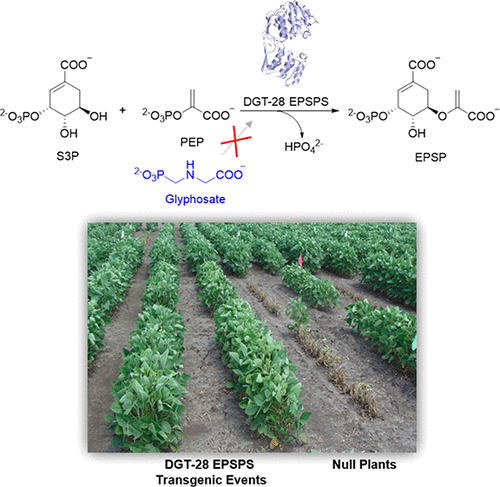当前位置:
X-MOL 学术
›
J. Agric. Food Chem.
›
论文详情
Our official English website, www.x-mol.net, welcomes your
feedback! (Note: you will need to create a separate account there.)
Characterization of a Glyphosate-Tolerant Enzyme from Streptomyces svecius: A Distinct Class of 5-Enolpyruvylshikimate-3-phosphate Synthases
Journal of Agricultural and Food Chemistry ( IF 5.7 ) Pub Date : 2021-04-07 , DOI: 10.1021/acs.jafc.1c00439 Samantha L Griffin 1 , Jonathan R Chekan 2, 3 , Justin M Lira 1 , Andrew E Robinson 1 , Carla N Yerkes 1 , Daniel L Siehl 1 , Terry R Wright 1 , Satish K Nair 2 , Robert M Cicchillo 1
Journal of Agricultural and Food Chemistry ( IF 5.7 ) Pub Date : 2021-04-07 , DOI: 10.1021/acs.jafc.1c00439 Samantha L Griffin 1 , Jonathan R Chekan 2, 3 , Justin M Lira 1 , Andrew E Robinson 1 , Carla N Yerkes 1 , Daniel L Siehl 1 , Terry R Wright 1 , Satish K Nair 2 , Robert M Cicchillo 1
Affiliation

|
Natural and modified versions of the 5-enolpyruvylshikimate-3-phosphate synthase (epsps) gene have been used to confer tolerance to the broad-spectrum herbicide glyphosate in a variety of commercial crops. The most widely utilized trait was obtained from the Agrobacterium tumefaciens strain CP4 and has been commercialized in several glyphosate-tolerant crops. The EPSPS gene products are enzymes that have been divided into three classes based on sequence similarity, sensitivity to glyphosate, and steady-state catalytic parameters. Herein, we describe the informatics-guided identification and biochemical and structural characterization of a novel EPSPS from Streptomyces sviceus (DGT-28 EPSPS). The data suggest DGT-28 EPSPS and other closely related homologues exemplify a distinct new class (Class IV) of EPSPS enzymes that display intrinsic tolerance to high concentrations of glyphosate (Ki ≥ 5000 μM). We further demonstrate that dgt-28 epsps, when transformed into stable plants, provides robust (≥4× field rates) vegetative/reproductive herbicide tolerance and has utility in weed-control systems comparable to that of commercialized events.
中文翻译:

来自链霉菌的草甘膦耐受酶的表征:一类独特的 5-烯醇丙酮莽草酸-3-磷酸合成酶
5-烯醇丙酮莽草酸-3-磷酸合酶 ( epsps ) 基因的天然版本和修饰版本已被用于赋予多种经济作物对广谱除草剂草甘膦的耐受性。最广泛使用的性状是从根癌农杆菌菌株 CP4 中获得的,并已在几种耐草甘膦作物中商业化。 EPSPS 基因产物是根据序列相似性、对草甘膦的敏感性和稳态催化参数分为三类的酶。在此,我们描述了来自链霉菌 (Streptomyces sviceus ) 的新型 EPSPS (DGT-28 EPSPS) 的信息学指导鉴定以及生化和结构表征。数据表明,DGT-28 EPSPS 和其他密切相关的同系物体现了 EPSPS 酶的独特新类别(IV 类),它们对高浓度草甘膦( K i ≥ 5000 μM)表现出内在耐受性。我们进一步证明,当dgt-28 epsps转化为稳定植物时,可提供强大的(≥4×田间施用量)营养/生殖除草剂耐受性,并且在杂草控制系统中具有与商业化事件相当的效用。
更新日期:2021-05-05
中文翻译:

来自链霉菌的草甘膦耐受酶的表征:一类独特的 5-烯醇丙酮莽草酸-3-磷酸合成酶
5-烯醇丙酮莽草酸-3-磷酸合酶 ( epsps ) 基因的天然版本和修饰版本已被用于赋予多种经济作物对广谱除草剂草甘膦的耐受性。最广泛使用的性状是从根癌农杆菌菌株 CP4 中获得的,并已在几种耐草甘膦作物中商业化。 EPSPS 基因产物是根据序列相似性、对草甘膦的敏感性和稳态催化参数分为三类的酶。在此,我们描述了来自链霉菌 (Streptomyces sviceus ) 的新型 EPSPS (DGT-28 EPSPS) 的信息学指导鉴定以及生化和结构表征。数据表明,DGT-28 EPSPS 和其他密切相关的同系物体现了 EPSPS 酶的独特新类别(IV 类),它们对高浓度草甘膦( K i ≥ 5000 μM)表现出内在耐受性。我们进一步证明,当dgt-28 epsps转化为稳定植物时,可提供强大的(≥4×田间施用量)营养/生殖除草剂耐受性,并且在杂草控制系统中具有与商业化事件相当的效用。




















































 京公网安备 11010802027423号
京公网安备 11010802027423号